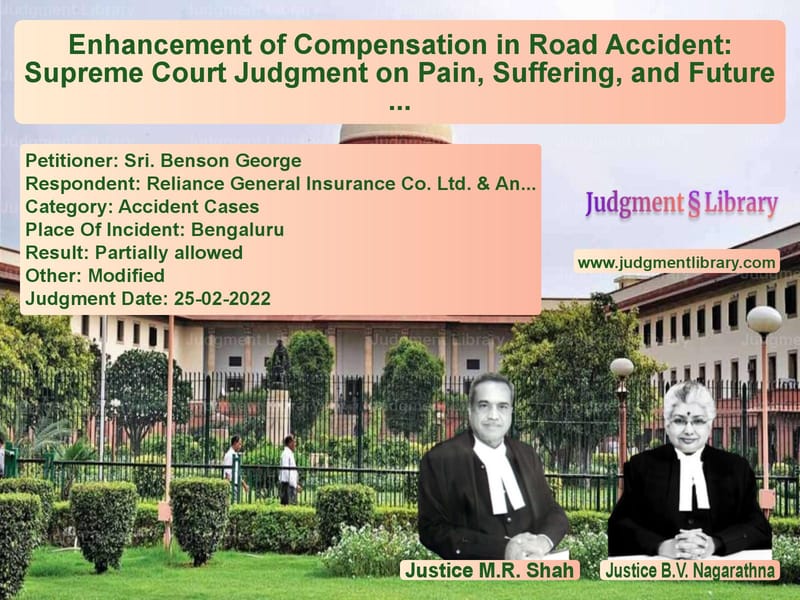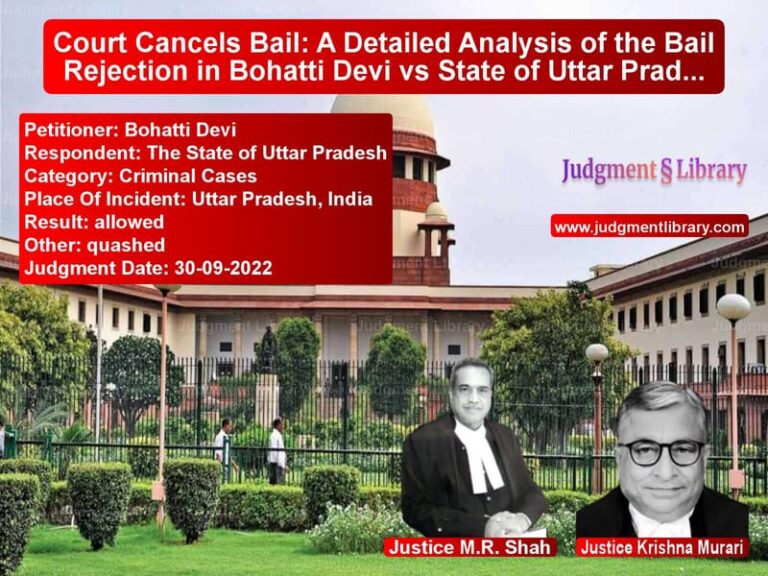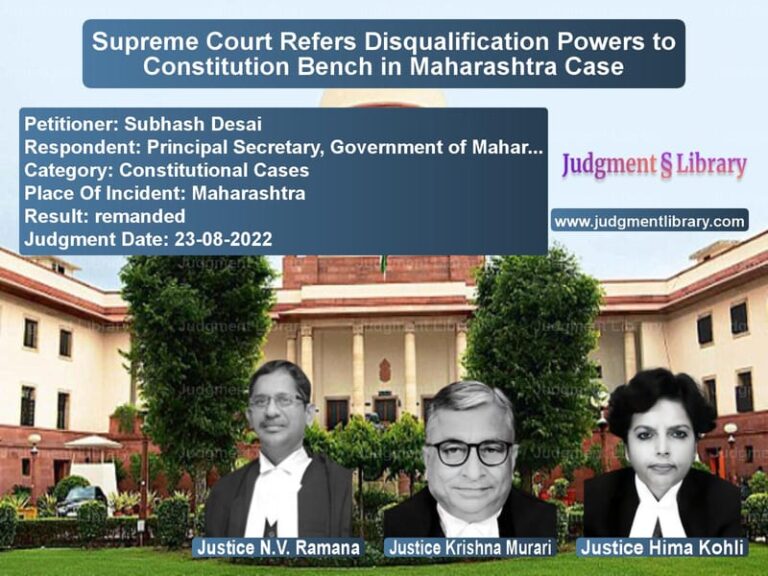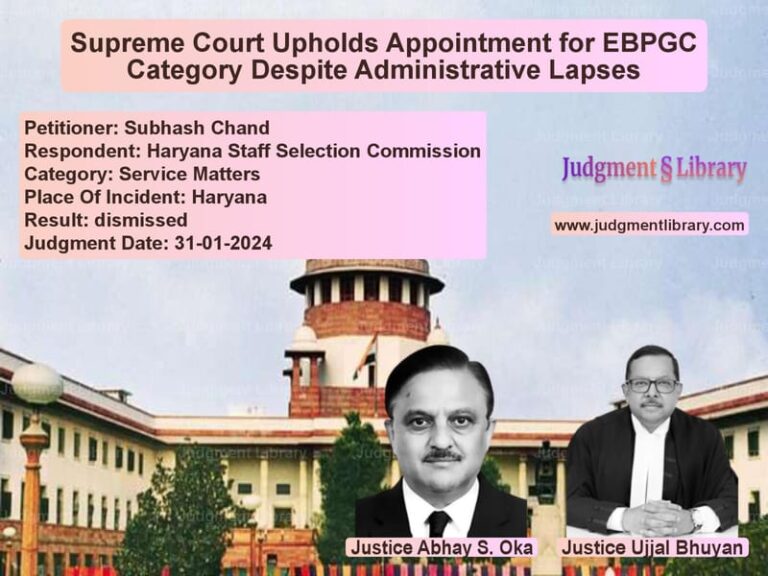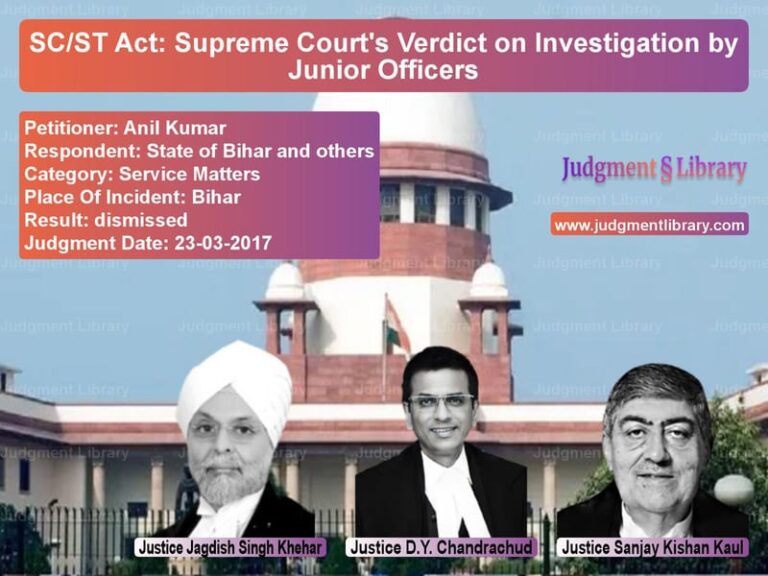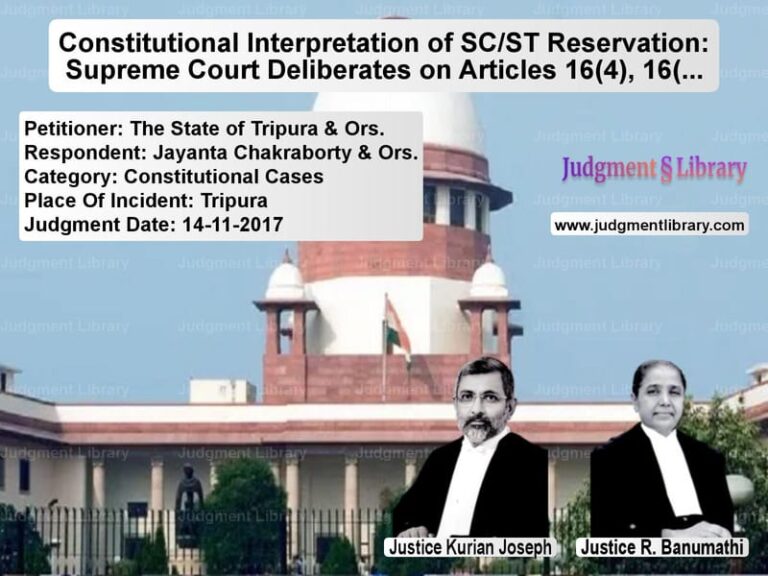Enhancement of Compensation in Road Accident: Supreme Court Judgment on Pain, Suffering, and Future Loss
The case of Sri. Benson George vs. Reliance General Insurance Co. Ltd. and Another is a landmark judgment concerning the enhancement of compensation in a road accident claim. The appellant, Mr. Benson George, sought an increase in the amount awarded for his grievous injuries and permanent disability caused by a vehicular accident on January 1, 2013. The Supreme Court, in its judgment, examined the legal principles surrounding pain and suffering, the loss of future amenities, and the award of compensation for life-altering injuries.
Background of the Case
The accident took place on January 1, 2013, when the claimant, Mr. Benson George, was involved in a severe road accident. The accident resulted in catastrophic brain injuries, and Mr. George underwent multiple surgeries. Following the accident, he was in a coma for an extended period and remained bedridden. At the time of the accident, the claimant was employed as a Process Supervisor at Deutsche Bank, with an annual income of Rs. 4,59,425. The accident left him with 100% disability, and his future earnings were permanently affected.
The appellant filed a claim petition before the Motor Accident Claims Tribunal (MACT), and the tribunal awarded a total compensation of Rs. 94,37,300 under various heads such as pain and suffering, medical expenses, and loss of future income. The insurance company, as well as the appellant, filed appeals before the High Court for an enhancement of the compensation amount. The High Court partly allowed the appeal and increased the compensation to Rs. 1,24,94,333, but the appellant still felt that the amount awarded was insufficient, particularly under the heads of pain and suffering and loss of future amenities.
Petitioner’s Arguments
In the appeal before the Supreme Court, the appellant’s counsel argued that:
- The compensation awarded by the High Court was inadequate, particularly the sum of Rs. 2,00,000 awarded under the head of pain and suffering. The appellant had undergone three major brain surgeries and had been in a coma for several months.
- The loss of future amenities and happiness was not sufficiently considered, as the appellant would remain bedridden and incapable of leading a normal life for the rest of his life.
- The High Court erred in awarding only Rs. 1,00,000 for the loss of future amenities, considering the claimant’s severe and permanent disability.
- The appellant also sought an increase in the rate of interest from 6% per annum to 9% per annum, as initially awarded by the MACT, to reflect the severity of the situation.
Respondent’s Arguments
The respondents, represented by the counsel for Reliance General Insurance Co. Ltd., countered by arguing:
- The High Court had rightly considered the appellant’s medical expenses, the loss of future income, and the overall impact on the claimant’s life. The compensation awarded was fair, given the circumstances.
- The amount awarded for pain and suffering was reasonable, considering the legal precedents that set a framework for compensation based on the nature of injuries and their permanent consequences.
- The respondents argued that the reduction of the interest rate from 9% to 6% was justified in the given circumstances, as the Court took into account the ongoing legal procedures and the time taken for the claim to be resolved.
Supreme Court’s Analysis
The Supreme Court, after considering the submissions from both parties, discussed the following key aspects:
- Nature of the Injury: The Court acknowledged that the injuries sustained by the claimant were catastrophic, leading to permanent disability and affecting his ability to work. The Court noted that the pain and suffering endured by the claimant could not be compensated with a simple monetary award, but still, a reasonable sum should be awarded under the head of pain and suffering, especially considering the prolonged hospitalizations and surgeries.
- Loss of Future Amenities: The Court further noted that the claimant, who was once capable of enjoying a normal life, was now bedridden for the rest of his life. The loss of future amenities and happiness was a significant aspect of the claim. The Court found that the amount of Rs. 1,00,000 awarded by the High Court under this head was insufficient given the nature of the claimant’s permanent disability.
- Comparison with Precedents: The Court also referred to previous judgments, including the case of Raj Kumar vs. Ajay Kumar, where the compensation for pain, suffering, and loss of amenities was enhanced based on the facts of the case. The Court noted that no straightjacket formula could be applied in determining the compensation amount, as each case depended on its unique facts.
Final Judgment
The Supreme Court, after considering the severity of the claimant’s condition, the duration of his suffering, and the legal principles involved, passed the following final judgment:
- The amount of compensation under the head of pain and suffering was enhanced from Rs. 2,00,000 to Rs. 10,00,000, considering the prolonged hospitalization, surgeries, and the mental and physical toll on the claimant.
- The amount awarded for the loss of future amenities and happiness was also enhanced from Rs. 1,00,000 to Rs. 10,00,000, given the permanent nature of the disability and the impact on the claimant’s quality of life.
- The total compensation amount was thus increased to Rs. 1,41,94,333, with an interest rate of 6% per annum from the date of filing the claim petition till realization.
- The respondent insurance company was directed to deposit the enhanced amount of compensation within four weeks. In the event of failure to do so, the interest rate on the enhanced amount would rise to 7.5% per annum.
Implications of the Judgment
This judgment has far-reaching implications for personal injury claims, particularly in vehicular accidents:
- Enhanced Compensation: The case reaffirms the principle that compensation for pain, suffering, and loss of future amenities must be reasonable and reflect the actual suffering and life-altering consequences faced by the claimant.
- Importance of Legal Precedents: The judgment draws on established legal principles but also emphasizes the need for flexibility, considering the specific facts of each case.
- Impact on Future Claims: The ruling will guide future claims for compensation in similar cases, especially where there is permanent disability and life-altering injuries.
Conclusion
The Supreme Court’s judgment in Sri. Benson George vs. Reliance General Insurance Co. Ltd. underscores the importance of providing adequate compensation to victims of severe accidents. The Court’s decision to enhance the compensation reflects the real-life consequences faced by the claimant, ensuring that victims of such tragic incidents receive fair redress. This case is a significant step in ensuring that compensation amounts are proportional to the extent of the injuries and the life-long suffering caused by such accidents.
Petitioner Name: Sri. Benson George.Respondent Name: Reliance General Insurance Co. Ltd. & Anr..Judgment By: Justice M.R. Shah, Justice B.V. Nagarathna.Place Of Incident: Bengaluru.Judgment Date: 25-02-2022.
Don’t miss out on the full details! Download the complete judgment in PDF format below and gain valuable insights instantly!
Download Judgment: sri.-benson-george-vs-reliance-general-ins-supreme-court-of-india-judgment-dated-25-02-2022.pdf
Directly Download Judgment: Directly download this Judgment
See all petitions in Road Accident Cases
See all petitions in Compensation Disputes
See all petitions in Motor Vehicle Act
See all petitions in Negligence Claims
See all petitions in Judgment by Mukeshkumar Rasikbhai Shah
See all petitions in Judgment by B.V. Nagarathna
See all petitions in partially allowed
See all petitions in Modified
See all petitions in supreme court of India judgments February 2022
See all petitions in 2022 judgments
See all posts in Accident Cases Category
See all allowed petitions in Accident Cases Category
See all Dismissed petitions in Accident Cases Category
See all partially allowed petitions in Accident Cases Category

